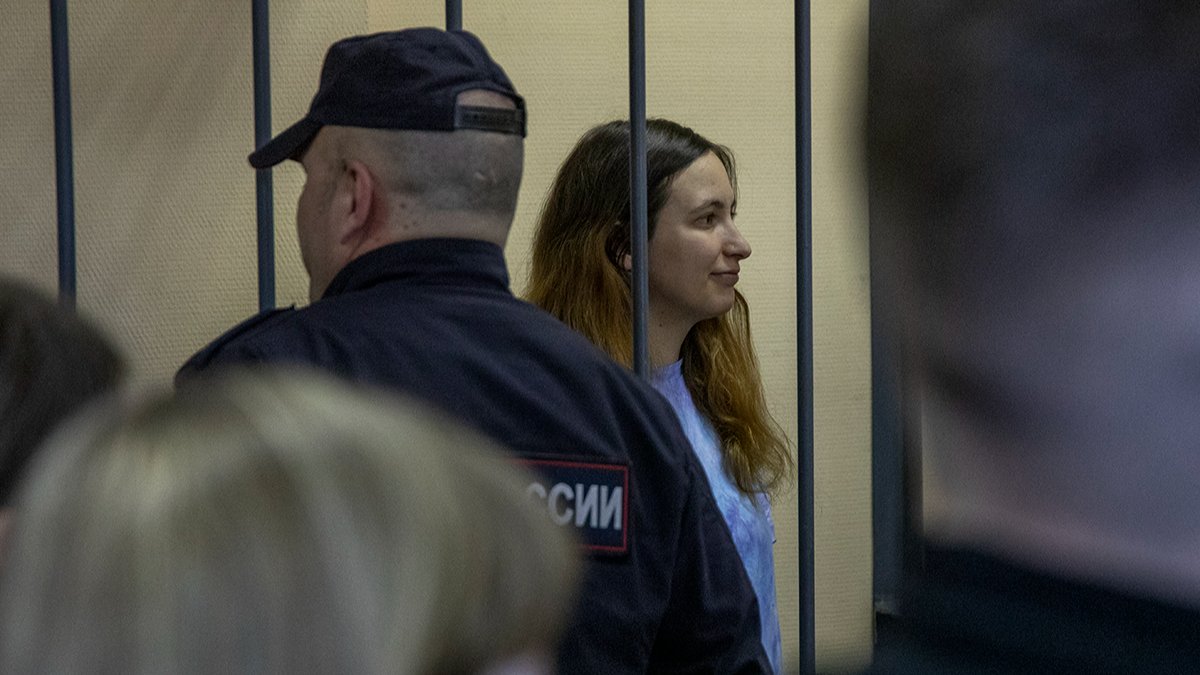“The case of Alexandra Skochilenko has been fabricated. The prosecution has no real evidence of guilt. The five volumes of the criminal case contain pure rubbish and result in 100 sheets of nothing but informational junk,” this is how the defence of the St. Petersburg artist, musician, and videographer assessed the evidence that state prosecutor Irina Nikandrova began presenting in court on 15 February. In response, she abruptly cut off the lawyers: “I am not interested in your assessment,” and promised to continue presenting the arguments of the prosecutor’s office at the next hearing on 17 February.
The first target
Consulate representatives of different countries (Germany, the Netherlands, Norway, Poland, Slovakia, Finland, Sweden, and Switzerland) invariably come to the St. Petersburg court for each hearing on the Skochilenko case. They no longer hide their surprise at how justice is being done in Russia, although they are limited in the ability to express their opinions publicly.
“We have no right to comment on the trial we are watching,” explained Petra Kohenderfer, the Deputy Consul General of Germany in St. Petersburg, to Novaya-Europe. “However, we regularly report on its progress to the ministries of our countries, since this story receives significant attention and interest from the global community.”
The Skochilenko case has received a huge response for at least two reasons. Firstly, even before being brought to criminal responsibility, Sasha (short for Alexandra) had been well-known:
- as a musician: starting in March 2022, she organised the anti-war musical “Jams of the World” (creative meetings to which anyone could come to play or listen to music);
- as an artist and author of comics that were included in her “Book About Depression” (in it the heroine — a girl named Sasha — shares her story of struggling with depressive episodes and bipolar affective disorder). After publishing the book online in 2014, and later in print, Skochilenko received many grateful reviews from readers. The “Book About Depression” was translated into Ukrainian, English, and Spanish, and the author was invited to thematic festivals, round tables, presentations, and seminars;
- as a videographer and an employee of the St. Petersburg newspaper called Paper (or Bumaga), who worked at Russian opposition rallies, including the famous Bolotnaya Square rally in Moscow in 2012.
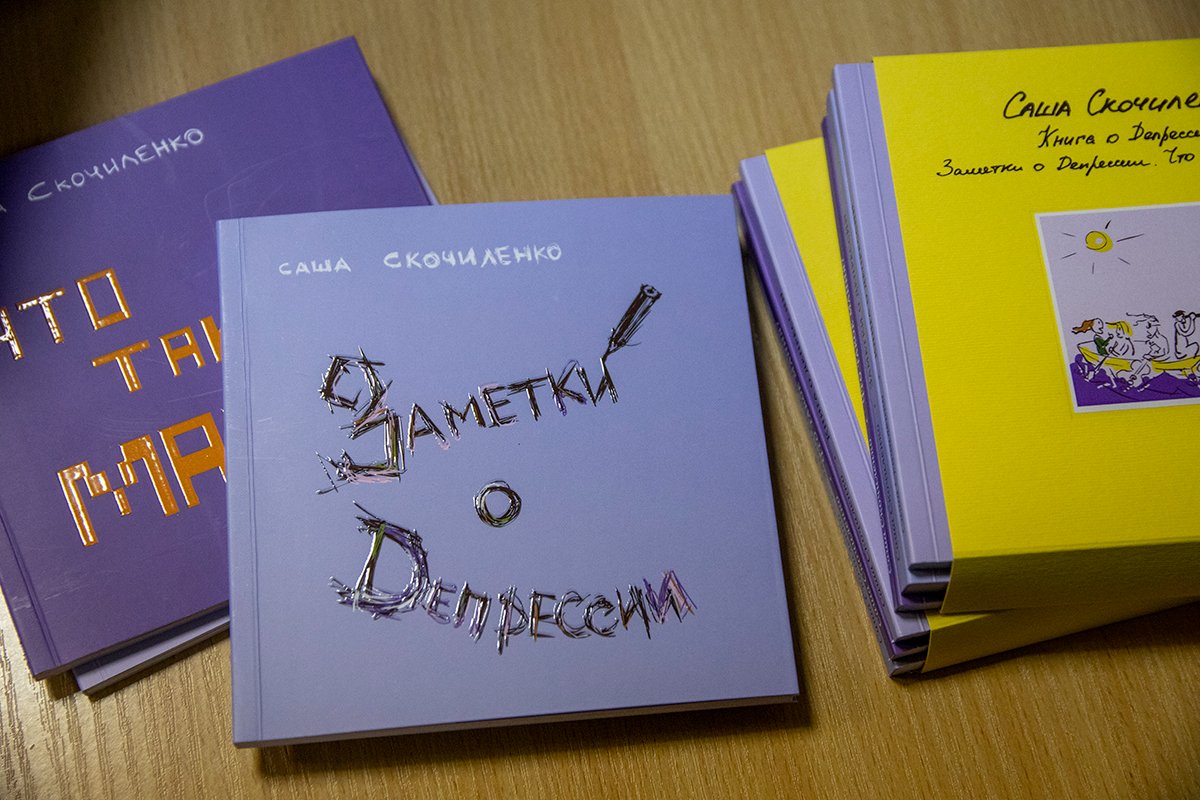
Books by Alexandra Skochilenko. Photo: Igor Selivanov, exclusively for Novaya Gazeta Europe
Secondly, Alexandra became the first person in St. Petersburg to be charged under a new article of the Russian Criminal Code — the so-called “fake news” law (“Public dissemination under the guise of reliable reports of deliberately false information about the use of the Armed Forces of the Russian Federation”).
Reported by a pensioner
According to investigators, at about 10 PM on 31 March, a young woman replaced price tags at a supermarket in St. Petersburg with five small pieces of paper. The new tags said the following:
- “The Russian army bombed an art school in Mariupol, about 400 people were hiding in it from shelling”;
- “Russian conscripts are being sent to Ukraine. The price of this war is the lives of our children. Stop the war”;
- “4,300 Russian soldiers were killed in the first three days. Why is TV silent about it?”;
- “Putin has been lying to us from TV screens for 20 years. The result of this lie is our willingness to justify the war and senseless deaths.”;
- “My great-grandfather fought in WW2 for four years not for Russia to become a fascist state and attack Ukraine.”
According to Novaya Gazeta Europe, 76-year-old St. Petersburg pensioner Galina Baranova stumbled upon the anti-war price tags that Skochilenko left in place of the original ones. According to the investigation, it was she who informed the police that “deliberate lies” were being spread in the supermarket. “Our soldiers would not allow the bombing of peaceful civilian objects, such as an art school… I am worried about our soldiers, and I am outraged by the slander against them. My hands were even shaking from indignation,” Baranova wrote in her statement.
On 13 April, the artist was arrested. In the indictment, the investigators charged Sasha under the “fake news” law, specifying that she committed the crime “on the grounds of political, ideological, racial, national or religious hatred or enmity or the grounds of hatred or enmity against any social group.” According to the newly-made law, Alexandra faces up to ten years in prison for these actions.
Support independent journalism
In the language of the prosecution
The trial of Skochilenko started on 15 December in St. Petersburg. At the very first meeting, Sasha asked the state prosecution to clarify: how exactly, in the opinion of the investigation, was her political hatred expressed? To which social group is the enmity addressed? To which parts of her statements are the claims made? And will the episodes that eventually turned out to be true be excluded from the case? Just one example: Skochilenko is accused of spreading false information about the presence of conscripts on the territory of Ukraine. However, this fact has long been officially confirmed by Russian President Vladimir Putin.
According to Alexandra’s defence, the investigation artificially established the qualifying signs of the charges she was presented with. Because of the obvious violations, the woman’s lawyers called the charge against her “incorrect, illogical and incomprehensible” and insisted on returning the case to the prosecutor’s office for review.
“There is not a single circumstance that allows the criminal case to be returned to the prosecutor’s office,” Irina Nikandrova, assistant prosecutor of the Vasileostrovsky district, objected to this to the defendant and her defence. “All the stated questions are, in fact, a disagreement with the prosecution, so there is no need to answer them. Skochilenko is defended by four people (lawyers Yuri Novolodsky, Dmitry Gerasimov, Yana Nepovinnova and public defender Margarita Kislyakova. — editor’s note), their joint efforts are enough to explain to the defendant what she is accused of,” summed up the state prosecutor.
“The fact that the charges are clear to the assistant prosecutor is obvious. Of course, it was comprehensible to him!” Yuri Novolodsky, Skochilenko’s lawyer, replied ironically. “But it is incomprehensible to any sane person. The case should be returned to the prosecutor’s office so that no such cases are ever sent to court. Based on the existing indictment, it is impossible to count on fair justice.”
However, judge Oksana Demyasheva agreed with the assistant prosecutor, rejected the petition of the defence and continued to consider the case as it is.
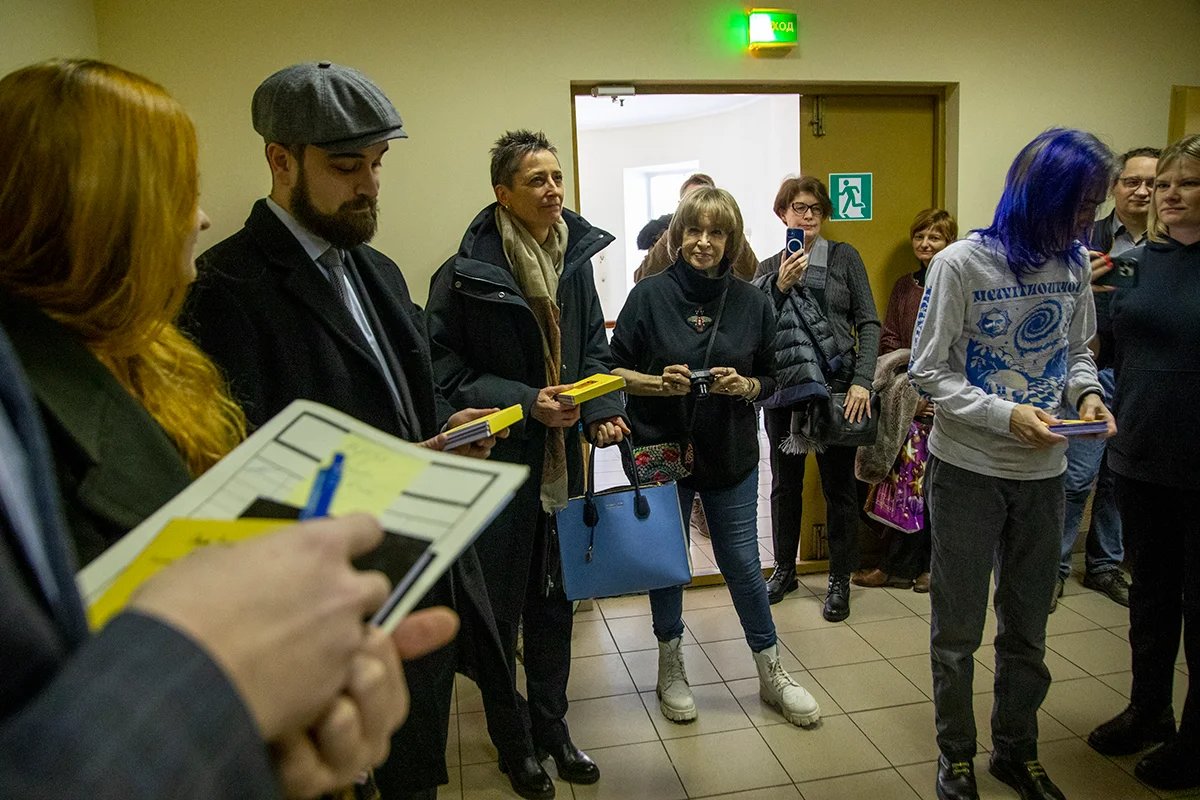
Outside the courtroom. Photo: Igor Selivanov, exclusively for Novaya Gazeta Europe
From the first person
The assistant district prosecutor, in turn, refused to interrogate Alexandra in court.
“I do not see the point in this, since Skochilenko does not answer questions, referring to Article 51 of the Constitution of the Russian Federation,” Irina Nikandrova argued.
“No, I do not answer, because the goal is not to establish the truth, but to present a stronger accusation,” Sasha reacted from the cage in the courtroom.
However, the defendant, according to the letter of the law, read out her written testimony in court:
“You can’t call me an activist,” the artist emphasised in her speech. “I have never been involved in political activity. I have done only one action in my life: I placed five inserts in the price tag holders in the Perekrestok store, they contained five texts that I am now accused of. But I was not the author of the texts. I saw ready-made price tag layouts on the Internet talking about the events taking place in Ukraine. I considered this information to be true since it corresponded to the information I received from other sources in Russian and English. I sincerely believed in the truthfulness of this information, which made it hard for me to experience the events unfolding in Ukraine at the end of February and during March 2022. I sincerely believed that the ‘special military operation’ had purely formal differences to the well-known concept of ‘war’. I proceeded from this, from the generally accepted concept of ‘war’, and, as subsequent events have shown, I was not mistaken. Heavy weapons, modern aircraft, tanks, artillery units, as well as modern small arms designed to defeat the enemy’s manpower were immediately used by both opposing sides, who found themselves in the centre of the events generated by the beginning of the operation… The idea that young people ‘representing the interests of their states’ were dying on both sides did not give me peace of mind. I was constantly crying and looking for an opportunity to stop this deadly nightmare.
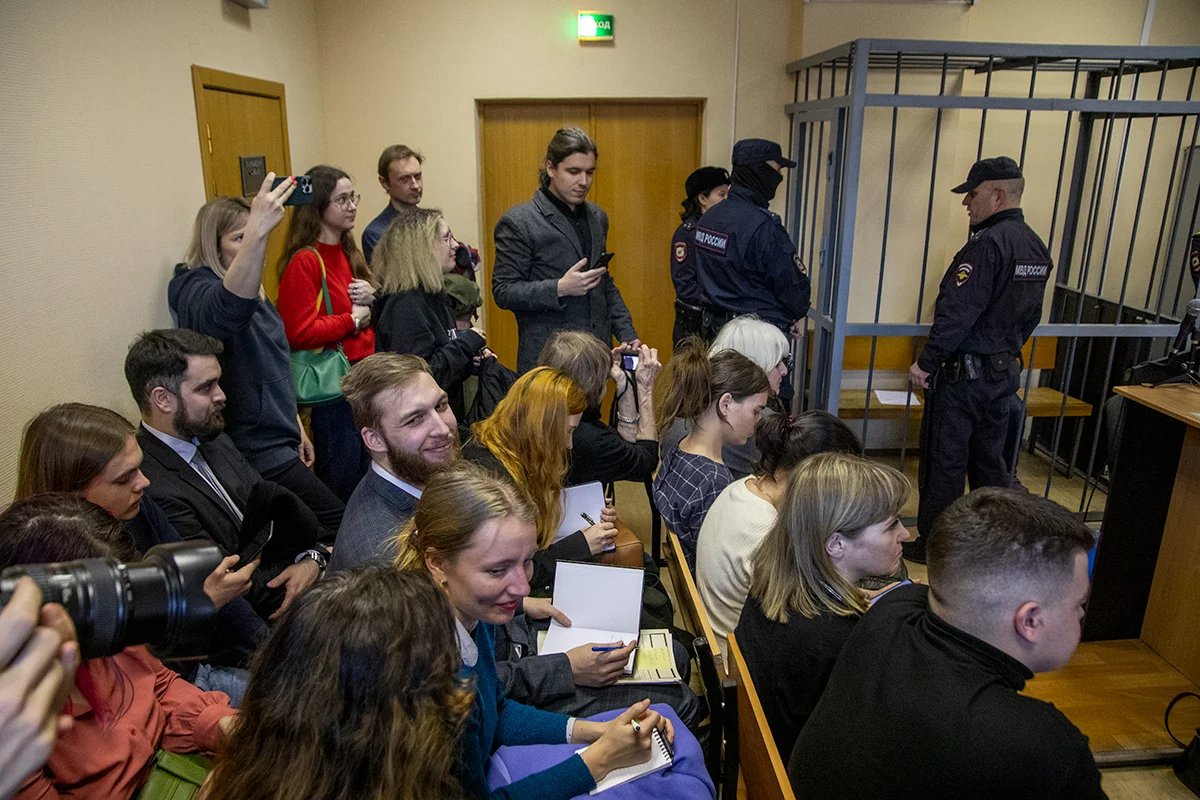
In the courtroom. Photo: Igor Selivanov, exclusively for Novaya Gazeta Europe
What to do in case of a fire
On 15 February, Nikandrova promised to present the prosecution’s position in detail. However, as evidence of the defendant’s guilt, a stern lady in a blue uniform suddenly began to read out documents from the first volume of the criminal case of Skochilenko (there are five volumes in total). Even the bailiffs guarding Sasha were unable to hide their smiles at times. Among the “evidence” were, for example, job descriptions and personal data of employees of the supermarket: a sales consultant, a sales cashier, a manager, an assistant in the cash register area, a production technologist, a baker, a specialist in ordering and accepting goods, a leading commodity expert, a security guard and others, as well as rules of conduct in case of fire and emergencies, instructions for operating an automatic door and other equally valuable documents.
“Are you serious about all this?”, at some point, lawyer Yuri Novolodsky could not stand it anymore. “What do the job instructions of a commodity expert, a baker, or a security guard’s work schedule have to do with proving Skochilenko’s guilt?”
The defender repeated questions about the evidentiary value of a particular instruction or memo presented by the prosecution more than once. Nikandrova arrogantly ignored everything, but every time she did not hesitate to point out to the judge that Novolodsky “behaves disrespectfully and offensively” and asked to issue a warning to the lawyer. Judge Oksana Demyasheva did it seven times in two hours of the hearing!
“As a result, we were even forced to object to the actions of the court chairman since we did not have any adversarial process,” says Sasha’s lawyer Yana Nepovinnova. “Seven warnings were issued to the lawyer Novolodsky and none to the prosecutor. Even though she allowed herself such phrases as ‘clown behaviour’ to the defender and pointed out Novolodsky’s advanced age when he did not hear and asked to repeat what she was quietly reading.
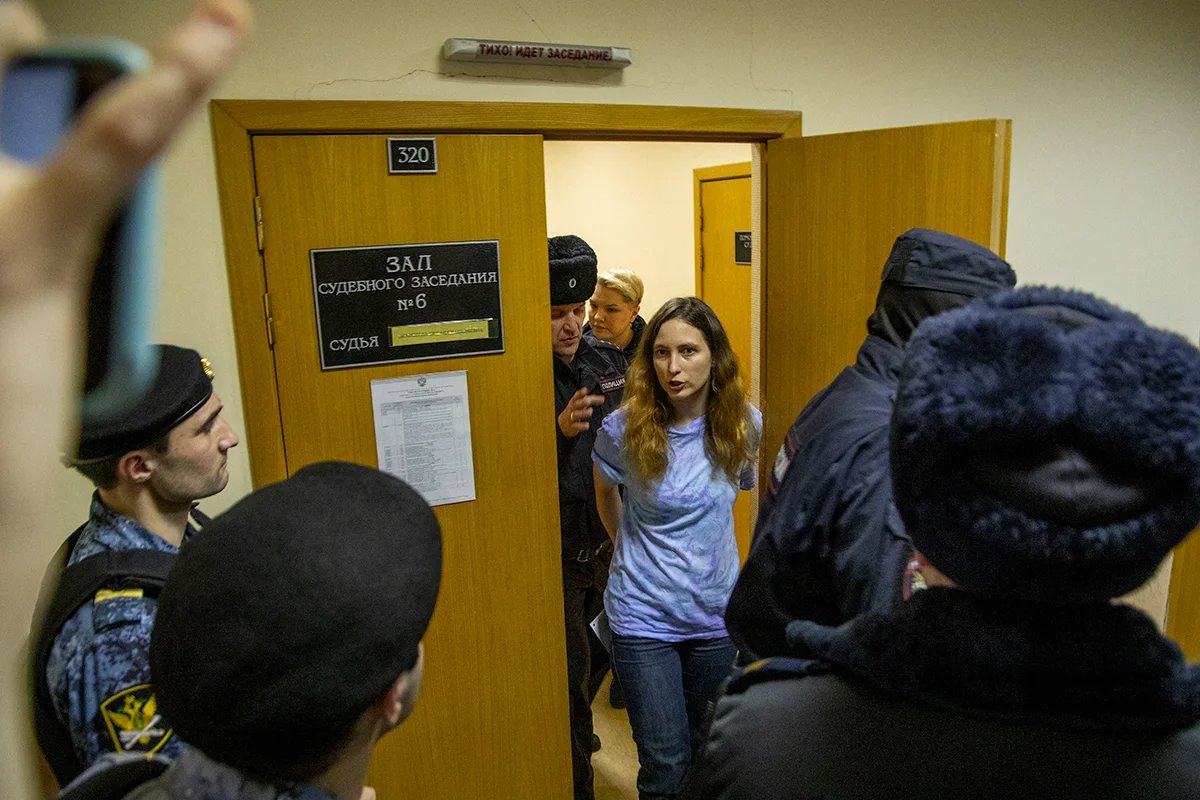
Alexandra Skochilenko. Photo: Igor Selivanov, exclusively for Novaya Gazeta Europe
And lunch is on schedule
“The state prosecutor, apparently, is not used to the fact that lawyers do not sit and nod, do not take a conciliatory position, but actively defend their client and comment on each piece of the so-called evidence presented. According to the assistant prosecutor, the lawyers insult her, the investigation, and the court when they point out procedural violations and make statements and objections,” said Dmitry Gerasimov, Skochilenko’s lawyer.
The assistant prosecutor is clearly used to a standardised working day: you can check the hours. So, at the last meeting, which fell on Friday, 20 January, at 16.55, Nikandrova directly stated: “My working day is over, I will continue at the next meeting.” On Wednesday, 15 February, by 17.45, the state prosecutor finished reading the first volume of the criminal case, returned it to the judge’s desk and said: “I’m done for today.” Despite the petitions of the defendant and the defence to continue the trial, Nikandrova firmly decided to read the second volume on 17 February.
“Procedural insanity is getting stronger. The state prosecutor was reading the evidence of Skochilenko’s guilt for an hour and a half, but in the end, did not announce any. This is clear even if you’re not a lawyer, and it is worthy of judicial proceedings in such fabricated criminal cases,” Yuri Novolodsky commented on what was happening at the end of the meeting. “No one promised that by 2023 fair justice will remain in Russia. Only this remains. But our task, despite such deplorable justice, is to fight for those people whose actions, if they are not criminal, should be encouraged by society.
Join us in rebuilding Novaya Gazeta Europe
The Russian government has banned independent media. We were forced to leave our country in order to keep doing our job, telling our readers about what is going on Russia, Ukraine and Europe.
We will continue fighting against warfare and dictatorship. We believe that freedom of speech is the most efficient antidote against tyranny. Support us financially to help us fight for peace and freedom.
By clicking the Support button, you agree to the processing of your personal data.
To cancel a regular donation, please write to [email protected]
